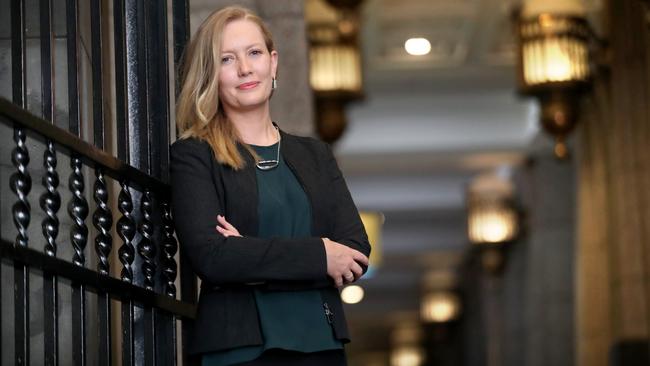Call to crack down on Google data harvest
Google’s harvesting of location data represents the tip of the iceberg, the Consumer Policy Research Centre chief says.

Google’s harvesting of Australians’ location data represents the tip of the iceberg according to the Consumer Policy Research Centre chief executive Lauren Solomon, who is calling for urgent reform of the Privacy Act to better protect consumers against the murky and vague data practices of the tech giants.
“Consumers might think they have a relationship with one company, but in turn their data is being sold to a whole host of other companies, called data brokers, and the consumer is often not even aware of their existence,” Ms Solomon said.
“They’ll take data points like location, biometrics, transaction data, and when the data is combined, companies can make really granular inferences about consumers, things like their marital status, stress levels, and personal interests.
“There needs to be an investigation into data brokers in Australia. We really haven’t got a grip on this issue and we need to come to terms with the reality of what’s going on behind the scenes.”
Ms Solomon pointed to Woolworths and its loyalty card as an example of data misuse. CPRC research found the company collected transaction data not just when a Rewards card is scanned, but also when a user’s credit or debit card is scanned, given it matches to their Rewards account. She said this resulted in a much larger data collection that extended beyond Woolworths Rewards-related purchases.
Personal data is the fuel powering the growth engines of today’s tech behemoths and, according to Ms Solomon, consumers are mostly in the dark about the footprints they leave behind every time they are on the web.
From streaming TV shows, podcasts and songs to checking the train timetable, every interaction on the internet leaves behind a trace. These individual footprints can be pieced together to create a map of an individual’s daily habits, their behaviour and preferences.
According to Ms Solomon, data tracking is now an inescapable part of the internet, with tireless trackers working at all times, both offline and online.
While the data collected was used to provide a gamut of targeted services to consumers, Ms Solomon said the entire architecture of data collection was almost entirely opaque.
“Companies often know an awful lot about a consumer but the consumer doesn’t know much about them,” she said.
“It’s not transparent what data is being collected, and who it is being shared with.
“Companies use terms like ‘we share with trusted partners and third parties’, but we have no way of identifying who they are.”
She said most technology companies played lip service to privacy, relying on convoluted policy documents to befuddle consumers. “Trust is critical to the digital economy and we need to be empowered with our data to have better control and choice,” she said. “We also need greater protections against exploitation, because as companies gather far more data on people, the power imbalance between consumers and companies increases and therefore the scope for exploitation is greater.”
Google is facing a multi-million-dollar fine in Australia, after the consumer watchdog launched Federal Court action alleging the tech giant misled consumers about the location data it collected.
Australian Competition & Consumer Commission chairman Rod Sims, who has been a vocal critic of the power wielded by the US tech giants, said Google’s menu settings from January 2017 until late 2018 were misleading, including that users’ location data would continue to be sent to Google even if the ‘location history’ option was switched off.
“We want declarations that the past behaviour was inappropriate. We want declarations that the current behaviour should not continue,” Mr Sims said.
“Secondly, we want significant penalties.
“Thirdly, we want Google to have to let people know what’s gone on, so that people have a greater awareness of what data is actually being collected here.”
He said he thought there could be issues with other devices using Google applications, but that this particular case was limited to Android smartphone devices.
Location data powers everything from Uber and Deliveroo to Google Maps, but the benefits for the public come at a cost.
Child image protection and photo storage provider Pixevety’s chief marketing officer, Tammy Anson, said the data was being collected without the express consent of users.
“Location data is collected to assist in targeting ads and search results, for commercial gain, but this data is collected without consent or appropriate disclosure,” Ms Anson said.
According to Ms Anson, collecting people’s location data without consent is like stalking.
“Let’s just say a person doesn’t want others to know that at midday every day they are visiting a brothel, hair transplant company, TAB, fertility clinic, or oncologist,” she said.
“We don’t want strangers knowing our every move.
“Surveying someone’s life 24 hours a day 365 days of the year without their consent or knowledge has to be one of the biggest invasions of privacy ever undertaken by a commercial entity.
“Google is a marketing giant with a poor track record for privacy. If this was not a large business, fines would not be enough — some jail time would be expected.”
Privacy will be a key concern discussed by Ms Solomon at a Melbourne data conference, dubbed Data (R) Evolution, this month alongside Mr Sims and eSafety commissioner Julie Inman Grant.



To join the conversation, please log in. Don't have an account? Register
Join the conversation, you are commenting as Logout